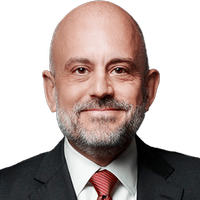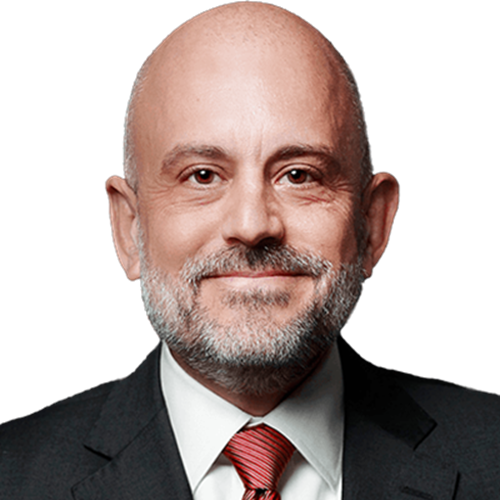Financial Freedom in Retirement Is All About Cash Flow
You may think accumulation is the most important part of the game, but income is like water: You can’t live without it.


Profit and prosper with the best of Kiplinger's advice on investing, taxes, retirement, personal finance and much more. Delivered daily. Enter your email in the box and click Sign Me Up.
You are now subscribed
Your newsletter sign-up was successful
Want to add more newsletters?

Delivered daily
Kiplinger Today
Profit and prosper with the best of Kiplinger's advice on investing, taxes, retirement, personal finance and much more delivered daily. Smart money moves start here.

Sent five days a week
Kiplinger A Step Ahead
Get practical help to make better financial decisions in your everyday life, from spending to savings on top deals.

Delivered daily
Kiplinger Closing Bell
Get today's biggest financial and investing headlines delivered to your inbox every day the U.S. stock market is open.

Sent twice a week
Kiplinger Adviser Intel
Financial pros across the country share best practices and fresh tactics to preserve and grow your wealth.

Delivered weekly
Kiplinger Tax Tips
Trim your federal and state tax bills with practical tax-planning and tax-cutting strategies.

Sent twice a week
Kiplinger Retirement Tips
Your twice-a-week guide to planning and enjoying a financially secure and richly rewarding retirement

Sent bimonthly.
Kiplinger Adviser Angle
Insights for advisers, wealth managers and other financial professionals.

Sent twice a week
Kiplinger Investing Weekly
Your twice-a-week roundup of promising stocks, funds, companies and industries you should consider, ones you should avoid, and why.

Sent weekly for six weeks
Kiplinger Invest for Retirement
Your step-by-step six-part series on how to invest for retirement, from devising a successful strategy to exactly which investments to choose.
If things you thought were true were actually wrong, when would you want to know?
When I was a child, I recall my mother saying that drinking and driving was against the law. For many years after that, whenever I saw someone drinking a soda while driving, I assumed they were criminals. Years later, I figured out that my mother was talking about drinking alcohol while driving.
I can laugh at the absurdity of this today, but it is the perfect example of how easy it can be to carry around half-truths when you don’t know what you don’t know.
From just $107.88 $24.99 for Kiplinger Personal Finance
Become a smarter, better informed investor. Subscribe from just $107.88 $24.99, plus get up to 4 Special Issues

Sign up for Kiplinger’s Free Newsletters
Profit and prosper with the best of expert advice on investing, taxes, retirement, personal finance and more - straight to your e-mail.
Profit and prosper with the best of expert advice - straight to your e-mail.
Many people go through life believing things without ever considering the possibility that those things are actually wrong. I see it every day in nearly every conversation I have with people: the misinterpretation of financial terms, the misapplication of various wealth strategies and confusion about how much risk they are actually taking.
Why does this happen? Well, the internet gives everyone instant access to unlimited amounts of information. Unfortunately, there is rarely any context, and we have a tendency as human beings to process information as true or false based on the source and a basic understanding of the topic. If Google says it, then it must be true! As a result, people end up with a false sense of confidence and a laundry list of beliefs that aren’t necessarily true.
Misconceptions come with costly consequences
Your financial future rests on your understanding of what you’re doing and why you’re doing it, and the consequences are real. Any misinterpretations you may have about money could potentially destroy your quality of life and reduce your chances of experiencing true financial freedom.
The biggest obstacle to unlearning something you have always thought was true is to accept the possibility of having inaccurate information. Once you do that, unlearning bad financial information is not as complicated as you may think.
The biggest misconception I see over and over again is the focus on accumulation. People tend to evaluate their progress or level of financial success based on how much money they accumulate. While having money in the bank is important, reliable cash flow should be the ultimate goal.
Think about it: You can survive without any money accumulated, but you cannot easily get by without cash flow. Cash flow can be generated in any number of ways: a paycheck from your job, a business you own or a passive-income source. Regardless of where it comes from, cash flow is like water – you simply cannot survive without it. (To see some strategies for increasing cash flow in retirement, check out my Cash Flow Guide.)
How to know if your money is fulfilling its primary purpose
Money is obviously a big part of our lives, so we have a tendency to desire more of it. But how do you decide how much is enough?
What I find is that people often use arbitrary account balances and rates of return to assess how much progress they have made, but neither of these things actually indicates whether your money is fulfilling its primary purpose: income replacement, also known as cash flow.
While having money is, of course, part of the equation, it is the wrong measurement for success. A lot of people with plenty of money still struggle with not feeling financially free or confident, and that is a problem.
Achieving financial confidence starts with answering these two questions:
- How much actual income do you have coming in right now that you don’t have to work to receive? I am talking about actual dollars being deposited into your checking account or brokerage account.
- If you quit working tomorrow, how much money would you need to cover all of your expenses? This includes taxes, trips, lifestyle expenses, etc.
If you’re like most people, there is a gap between how much income you’re receiving and how much you need. (That is why you work, to fill that gap.) If you want to stop working, you’ll need to figure out how to close this gap with passive income.
How is financial security different from financial freedom?
So, how do you do that? Start by understanding the difference between financial security and financial freedom.
The idea of financial security cannot necessarily be defined by exact numbers or percentages and is often expressed as a feeling of safety. That’s why most people focus on reducing debt and accumulating money. They believe that spending less, paying less in interest and earning more on their investments is what will lead them to a successful retirement.
Having large sums of money brings a sense of financial security, but it does not create financial freedom. If you’re like most people, knowing creates more confidence than assuming, and a good way to know is to complete a Gap Report™. (Get your GAP Report™ here.)
Security vs. independence vs. freedom
I speak with people every week who have millions of dollars saved but don’t feel financially free. They say things like, “I think I will be OK,” or “I feel OK with what I have,” but their word choices — “I think” and “I feel” — say it all: They are not confident.
In short, if you have large sums of money, but you are still working to support your income needs, worried about market returns or uncertain about the future… that is not freedom.
There is a middle ground where you have both financial security and lifestyle flexibility in the short term, which I refer to as “financial independence.” For instance, many business owners have companies or real estate that create a revenue stream. Their business runs without their full attention, allowing them flexibility to do what they want when they want, but they must still contribute at some level in order to maintain their income sources.
Rental properties are the perfect example of great cash flow machines that generate income to potentially support your lifestyle and help you achieve financial independence. It is obviously a good thing to have these assets growing and producing income, but it still takes time and effort.
You may have a pretty great life collecting rent from your tenants, but the simple fact that you must collect it is work, not to mention addressing repairs and upkeep, managing expenses and (worst of all) dealing with unhappy people.
There is nothing wrong with running a business to provide cash flow. For some people, their business is their passion, but it is difficult to achieve true financial freedom when the business income relies upon you showing up.
This is why many people who have considerable rental properties often cash out and move to sources of passive income — because they want true financial freedom.
A true source of passive income is one where you don’t have to do anything to generate it, including Social Security, pensions, annuities, private markets and royalties.
Now, we can argue about the definitions of financial security vs. independence vs. freedom, but that would be missing the point.
Passive income is the path to financial freedom
Failing to understand the differences comes with a cost. If the point is to have enough passive income to cover your cash flow needs, why would you spend thirty-plus years measuring your progress based on account balances and rates of return?
As you can see, words matter, and definitions are important. These conflicting ideas could be why so many people think that they are on the path toward achieving freedom but never seem to reach it. They fall short of the goal because they don’t truly understand what is needed to have financial freedom and are steadfast on accumulating assets.
To have financial freedom, you have to have passive income. If you have to have passive income, then focus on building reliable income sources. It is that simple.
For more information on creating passive income and achieving financial freedom, visit brianskrobonja.com.
Securities offered only by duly registered individuals through Madison Avenue Securities, LLC. (MAS), Member FINRA & SIPC. Advisory services offered only by duly registered individuals through AE Wealth Management (“AEWM”), a registered investment advisor. Tax services offered only through Skrobonja Tax Consulting. MAS does not offer Build Banking or tax advice. Skrobonja Financial Group, LLC, Skrobonja Insurance Services, LLC, Skrobonja Tax Consulting, and Build Banking are not affiliated with MAS or AEWM.
The information and opinions contained herein are provided by third parties and have been obtained from sources believed to be reliable, but accuracy and completeness cannot be guaranteed. They are given for informational purposes only and are not a solicitation to buy or sell any of the products mentioned. The information is not intended to be used as the sole basis for financial decisions, nor should it be construed as advice designed to meet the particular needs of an individual's situation.
The appearances in Kiplinger were obtained through a PR program. The columnist received assistance from a public relations firm in preparing this piece for submission to Kiplinger.com. Kiplinger was not compensated in any way. The views and opinions expressed by Brian Skrobonja are those of the authors and do not necessarily reflect the official policy or position of Kiplinger, AE Wealth Management LLC, or Madison Avenue Securities, LLC.
Profit and prosper with the best of Kiplinger's advice on investing, taxes, retirement, personal finance and much more. Delivered daily. Enter your email in the box and click Sign Me Up.

Brian Skrobonja is a Chartered Financial Consultant (ChFC®) and Certified Private Wealth Advisor (CPWA®), as well as an author, blogger, podcaster and speaker. He is the founder and president of a St. Louis, Mo.-based wealth management firm. His goal is to help his audience discover the root of their beliefs about money and challenge them to think differently to reach their goals. Brian is the author of three books, and his Common Sense podcast was named one of the Top 10 podcasts by Forbes. In 2017, 2019, 2020, 2021 and 2022, Brian was awarded Best Wealth Manager. In 2021, he received Best in Business and the Future 50 in 2018 from St. Louis Small Business.
-
 Ask the Tax Editor: Federal Income Tax Deductions
Ask the Tax Editor: Federal Income Tax DeductionsAsk the Editor In this week's Ask the Editor Q&A, Joy Taylor answers questions on federal income tax deductions
-
 States With No-Fault Car Insurance Laws (and How No-Fault Car Insurance Works)
States With No-Fault Car Insurance Laws (and How No-Fault Car Insurance Works)A breakdown of the confusing rules around no-fault car insurance in every state where it exists.
-
 7 Frugal Habits to Keep Even When You're Rich
7 Frugal Habits to Keep Even When You're RichSome frugal habits are worth it, no matter what tax bracket you're in.
-
 For the 2% Club, the Guardrails Approach and the 4% Rule Do Not Work: Here's What Works Instead
For the 2% Club, the Guardrails Approach and the 4% Rule Do Not Work: Here's What Works InsteadFor retirees with a pension, traditional withdrawal rules could be too restrictive. You need a tailored income plan that is much more flexible and realistic.
-
 Retiring Next Year? Now Is the Time to Start Designing What Your Retirement Will Look Like
Retiring Next Year? Now Is the Time to Start Designing What Your Retirement Will Look LikeThis is when you should be shifting your focus from growing your portfolio to designing an income and tax strategy that aligns your resources with your purpose.
-
 I'm a Financial Planner: This Layered Approach for Your Retirement Money Can Help Lower Your Stress
I'm a Financial Planner: This Layered Approach for Your Retirement Money Can Help Lower Your StressTo be confident about retirement, consider building a safety net by dividing assets into distinct layers and establishing a regular review process. Here's how.
-
 The 4 Estate Planning Documents Every High-Net-Worth Family Needs (Not Just a Will)
The 4 Estate Planning Documents Every High-Net-Worth Family Needs (Not Just a Will)The key to successful estate planning for HNW families isn't just drafting these four documents, but ensuring they're current and immediately accessible.
-
 Love and Legacy: What Couples Rarely Talk About (But Should)
Love and Legacy: What Couples Rarely Talk About (But Should)Couples who talk openly about finances, including estate planning, are more likely to head into retirement joyfully. How can you get the conversation going?
-
 How to Get the Fair Value for Your Shares When You Are in the Minority Vote on a Sale of Substantially All Corporate Assets
How to Get the Fair Value for Your Shares When You Are in the Minority Vote on a Sale of Substantially All Corporate AssetsWhen a sale of substantially all corporate assets is approved by majority vote, shareholders on the losing side of the vote should understand their rights.
-
 How to Add a Pet Trust to Your Estate Plan: Don't Leave Your Best Friend to Chance
How to Add a Pet Trust to Your Estate Plan: Don't Leave Your Best Friend to ChanceAdding a pet trust to your estate plan can ensure your pets are properly looked after when you're no longer able to care for them. This is how to go about it.
-
 Want to Avoid Leaving Chaos in Your Wake? Don't Leave Behind an Outdated Estate Plan
Want to Avoid Leaving Chaos in Your Wake? Don't Leave Behind an Outdated Estate PlanAn outdated or incomplete estate plan could cause confusion for those handling your affairs at a difficult time. This guide highlights what to update and when.